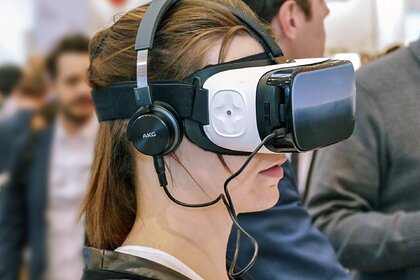Researchers from Samara State University (SamSU) have developed a test to assess the psychological qualities of an applicant using a virtual reality helmet. Such an idea will help employers to assess a person's personality when recruiting staff, [...] Izvestia writes.
It is noted that the test subject gets into a specially created virtual environment, which he perceives as real. At this time, the computer evaluates his physical and emotional state without the help of people. It is supposed to diagnose the psychological aspects of employees in particularly responsible positions in this way. You can also create a portrait of the ideal candidate once, after which artificial intelligence will show how much this or that person corresponds to this image.
The cost of such a system, which includes a computer and a VR helmet, will be about 120 thousand rubles. The program "Psychodiagnostics in VR" and joysticks that read the micro-movements of fingers are also connected there. The level of anxiety, the reaction to stress, emotional excitability, as well as the cognitive activity of a person, which will allow you to count the direction of the gaze, the reaction to stimuli and the time of fixation, is evaluated.
Experts reacted to the initiative ambiguously. Sports psychologist Olga Tiunova noted that for many years there have been attempts to create a psychological portrait of an ideal champion, but so far they have not been crowned with success. Special forces instructor Alexander Lastovina added that "Psychodiagnostics in VR" can be used when testing soldiers, but for this you should make sure of the effectiveness.
"The automatic system may very soon be at the disposal of every personnel officer, and the whole country will be forced to undergo such testing. As a result, a large number of employees are diagnosed with some personality traits, is this acceptable?" Alexander Fadeev, vice-rector of Tomsk Polytechnic University for Digitalization, asked a question. The system has yet to be tested on samples of several thousand participants. Experts also recalled that a person is something more than a set of psychological characteristics.
Earlier, Irish scientists recognized that computer games are useful in the fight against a number of mental illnesses: they have a beneficial effect on people with anxiety disorders and depression and may even be more useful than traditional methods of treatment. The researchers concluded that games can be used as an alternative to medical care. First of all, they are more accessible than trips to the doctors.
Marina Sovina

